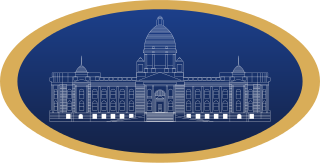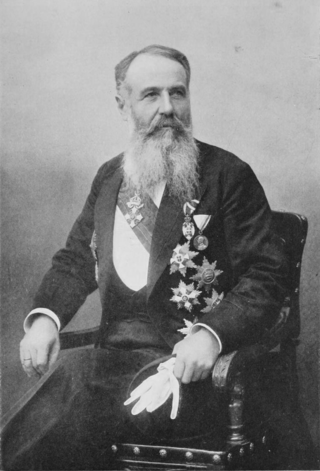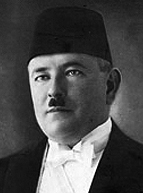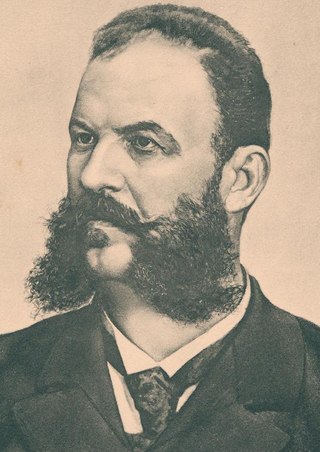 |
|---|
Parliamentary elections were held in Serbia on 14 September 1890 to elect members of the National Assembly. The result was a landslide victory for the People's Radical Party.
 |
|---|
Parliamentary elections were held in Serbia on 14 September 1890 to elect members of the National Assembly. The result was a landslide victory for the People's Radical Party.
The elections were the first held under the 1888 constitution. [1] Following the introduction of the new constitution, an Electoral Act was passed in March 1890, which provided for nearly universal male suffrage and introduced the secret ballot. [2]
The People's Radical Party won over 100 seats, while the Liberal Party won 14 and the Serbian Progressive Party just one (won by its leader Milutin Garašanin). [1]
| Party | Votes | % | Seats | |
|---|---|---|---|---|
| People's Radical Party | 152,935 | >100 | ||
| Liberal Party | 23,548 | 14 | ||
| Serbian Progressive Party | 8,895 | 1 | ||
| Total | ||||
| Source: Protić | ||||
Nikola Pašić was appointed president of the National Assembly and Dimitrije Katić as vice president. [1] When Pašić became Prime Minister in February 1891, Katić replaced him as president while Pavle Vuković became vice president.

The Kingdom of Yugoslavia was a country in Southeast and Central Europe that existed from 1918 until 1941. From 1918 to 1929, it was officially called the Kingdom of Serbs, Croats, and Slovenes, but the term "Yugoslavia" was its colloquial name due to its origins. The official name of the state was changed to "Kingdom of Yugoslavia" by King Alexander I on 3 October 1929.

The National Assembly is the unicameral legislature of Serbia. The assembly is composed of 250 deputies who are proportionally elected to four-year terms by secret ballot. The assembly elects a president (speaker) who presides over the sessions.

Nikola Pašić was a Serbian and Yugoslav politician and diplomat. During his political career, which spanned almost five decades, he served five times as prime minister of Serbia and three times as prime minister of Yugoslavia, leading 22 governments in total. He played an instrumental role in the founding of Yugoslavia and is considered one of the most influential figures in Serbian twentieth-century history. With 12 years in office, Pašić was the longest-serving prime minister of Serbia.

Svetozar Pribićević was a Croatian Serb politician in Austria-Hungary and later Kingdom of Yugoslavia. He was one of the main proponents of Yugoslavism and a federalized South Slavic state which would later turn out to be Yugoslavia. However, he later became a bitter opponent of the same policy that was promoted by King Alexander I.

Mehmed Spaho was a Bosnian politician and leader of the Yugoslav Muslim Organization. He was the first Bosnian Muslim politician in the Kingdom of Serbs, Croats and Slovenes. Spaho was described as the "undisputed leader of the Bosniaks between the two world wars" by the newspaper Oslobođenje in 2013. He died under mysterious circumstances in a Belgrade hotel.

The Banovina of Croatia or Banate of Croatia was an administrative subdivision (banovina) of the Kingdom of Yugoslavia between 1939 and 1941. It was formed by a merger of Sava and Littoral banovinas into a single autonomous entity, with small parts of the Drina, Zeta, Vrbas and Danube banovinas also included. Its capital was Zagreb and it included most of present-day Croatia along with portions of Bosnia and Herzegovina and Serbia. Its sole Ban during this period was Ivan Šubašić.

The Alliance of Independent Social Democrats is a Serb political party in Bosnia and Herzegovina. Founded in 1996, it is the governing party in Republika Srpska, with its leader, Milorad Dodik, serving as the current president of Republika Srpska. The party's vice-president, Željka Cvijanović, is the current member of the Presidency of Bosnia and Herzegovina, while SNSD member Radovan Višković is the current prime minister of Republika Srpska.

The Politics of Serbia are defined by a unitary parliamentary framework that is defined by the Constitution of Serbia in which the president, currently Aleksandar Vučić, is the head of state while the prime minister, currently Ana Brnabić, is the head of government. Executive power is exercised by the Serbian government and the President of Serbia. Legislative power is vested in the unicameral National Assembly which is composed of 250 proportionally elected deputies. The judiciary is independent and is headed by the Supreme Court of Cassation, which is also the highest court in Serbia.
This article gives an overview of conservatism in Serbia. It is limited to conservative parties with substantial support, mainly proved by having had a representation in parliament. The sign ⇒ means a reference to another party in that scheme. For inclusion in this scheme it is not necessary so that parties labeled themselves as a conservative party.
The People's Radical Party was a populist political party in Serbia and later Yugoslavia. Led by Nikola Pašić for most of its existence, its ideological profile has significantly changed throughout its history, shifting from socialism and radicalism towards conservatism in the early 20th century.
Constitutional Assembly elections were held in the Kingdom of Serbs, Croats and Slovenes on 28 November 1920. The Democratic Party emerged as the largest faction, winning 92 of the 419 seats. Deputies are elected by secret ballot, in a direct manner, by the electoral quotient system. The 1920 elections were the first democratic elections in the Kingdom of Serbs, Croats and Slovenes. Shortly after the election, the Communist Party of Yugoslavia was banned by the authorities.
Parliamentary elections were held in the Kingdom of Serbs, Croats and Slovenes on 8 February 1925. The People's Radical Party remained the largest faction in National Assembly, winning 123 of the 315 seats, with Nikola Pašić remaining Prime Minister.

Kosta Taušanović was a Serbian politician, minister and banker. He studied agriculture in Tábor and commerce in Hohenheim (Germany). Taušanović was a prominent member of the People's Radical Party, among its founding members and one of the closest collaborators of its leader Nikola Pašić. A Russophile, and an opponent of the Obrenović dynasty, Taušanović was persecuted by the Royal government on several occasions. After the Timok Rebellion (1883) he was, along with many other Radical leaders, sentenced to eight years in prison, but was pardoned in early 1886. He was a negotiator of the Liberal-Radical Coalition of 1886. He was again in trouble with the authorities due to his Radical affiliation after the assassination attempt against ex-King Milan Obrenović (1889), as well as during the so-called Čebinac affair (1894).
The Vidovdan Constitution was the first constitution of the Kingdom of Serbs, Croats and Slovenes. It was approved by the Constitutional Assembly on 28 June 1921 despite the opposition boycotting the vote. The Constitution is named after the feast of St. Vitus (Vidovdan), a Serbian Orthodox holiday. The Constitution required a simple majority to pass. Out of 419 representatives, 223 voted for, 35 voted against and 161 abstained.
The Yugoslav Democratic Party, State Party of Serbian, Croatian and Slovene Democrats and Democratic Party, also known as the Democratic Union was the name of a series of liberal political parties that existed in succession in the State of Slovenes, Croats and Serbs and the Kingdom of Serbs, Croats and Slovenes.

Sava Grujić was a Serbian politician, statesman, general, army officer, and author, serving five times as Prime Minister of the Kingdom of Serbia under two different monarchs from 1887 to 1906.
Croatian Popular Party was a minor political party that acted as a political branch of the Croatian Catholic Movement and it existed between 1919 and 1929 in the Kingdom of Serbs, Croats and Slovenes. Until Stjepan Radić's assassination in National Assembly in Belgrade in 1928, the Croatian Catholic Movement was pro-Yugoslav, and after the assassination pro-Croatian within Yugoslavia. However, after the failure of the Yugoslav government to implement the concordate with the Holy See, the Croatian Catholic Movement became strictly pro-Croatian.
Dimitrije Katić was a Serbian economist, politician and president of the National Assembly. He is known for his concise and clear and evidence-based speeches.
Parliamentary elections were held in Serbia on 22 June 1897 to elect members of the National Assembly.